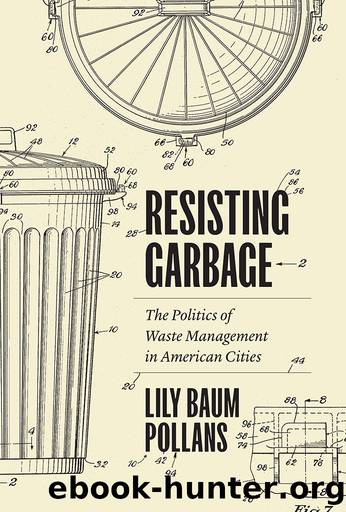Resisting Garbage: The Politics of Waste Management in American Cities by Lily Baum Pollans

Author:Lily Baum Pollans
Language: eng
Format: epub
Publisher: University of Texas Press
Published: 2021-11-15T00:00:00+00:00
CHAPTER 4
Compliant and Defiant Wasteways: Boston and Seattle within the WRWR
At the beginning of the 1980s, Seattle and Boston were in a similar predicament, but by the end of the decade they were in totally different places. Seattle had produced a new way of defining and managing waste, a defiant wasteway that chafed against the weak recycling waste regime. Boston, meanwhile, had constructed a compliant wasteway, and remained tethered to the WRWR. A cityâs wastewayâthe relationship between its waste system and the regime in which it is situatedâis shaped by how people and waste management organizations define waste; by who participates in that act of defining waste and waste problems; and by the roles and responsibilities of system managers and regular citizens.
The compliant wasteway that emerged in Boston through its waste planning process operated more or less as one might expect a creature of the weak recycling waste regime to function. Characterized by limited and incremental changes driven by actors with the most power in the system, it had the hallmarks of a modernist socio-technical regime. Garbage was defined as pollution, dirt to be removed. Until 2018, when the city launched a potentially transformative waste planning initiative, changes in the cityâs waste system did not challenge the fundamental relationships between citizens, the state, and private-sector service providers, and certainly did not challenge the extraction-manufacturing-consumption-waste chain. Beyond contributing the waste to be managed by the system, actors outside of city government and industry had only a limited role in waste planning or decision-making.
The key transformations that took place in Seattle, in contrast, created a defiant wasteway that challenged key fundamentals of the WRWR. The defiant wasteway positioned Seattle as a national waste management leader. Perhaps more significantly, it launched the city into a condition of constant evolution, incrementally moving in a different direction from the waste regime within which it was embedded. The redefinition of waste in Seattle led to the creation of a new set of institutions for governing waste. These institutions incentivized recycling, reuse, and reduction through service and infrastructure investment. In turn, citizen engagement with waste planning and management interfered with cultural and market-driven narratives of convenience and also âde-otheredâ garbageâgiving it positive material qualities. Seattleâs emphasis on material life cycles challenged the indomitable one-way march of disposability and planned obsolescence.
The waste system that evolved in Seattle was highly experimental and often encountered failures. When it pushed too far, it was disciplined, either by industry or by citizens themselves. But because the cityâs waste system transformation relied on solid institutions and a deep base of creative professional support, it has proven resilient. As a landscape in succession, the evolution of the defiant wasteway in Seattle has led to a system that is increasingly different from the waste regime within which it operates.
This chapter first traces the arc of Bostonâs compliant wasteway through a series of system changes that did little to alter the social, economic, or material profile of waste management in the city. It then follows Seattleâs
Download
This site does not store any files on its server. We only index and link to content provided by other sites. Please contact the content providers to delete copyright contents if any and email us, we'll remove relevant links or contents immediately.
| Automotive | Engineering |
| Transportation |
Machine Learning at Scale with H2O by Gregory Keys | David Whiting(4292)
Never by Ken Follett(3937)
Urban Outlaw by Magnus Walker(3392)
OPNsense Beginner to Professional by Julio Cesar Bueno de Camargo(3283)
Sapiens and Homo Deus by Yuval Noah Harari(3065)
Will by Will Smith(2908)
A Short History of Nearly Everything by Bryson Bill(2689)
Hooked: A Dark, Contemporary Romance (Never After Series) by Emily McIntire(2550)
Rationality by Steven Pinker(2352)
Borders by unknow(2303)
The Becoming by Nora Roberts(2188)
Holy Bible (NIV) by Zondervan(2123)
A Short History of War by Jeremy Black(1842)
HBR's 10 Must Reads 2022 by Harvard Business Review(1839)
The One Percenter Encyclopedia by Bill Hayes(1825)
Freedom by Sonny Barger(1794)
Go Tell the Bees That I Am Gone by Diana Gabaldon(1754)
Five Ways to Fall by K.A. Tucker(1737)
Girls Auto Clinic Glove Box Guide by Patrice Banks(1725)
